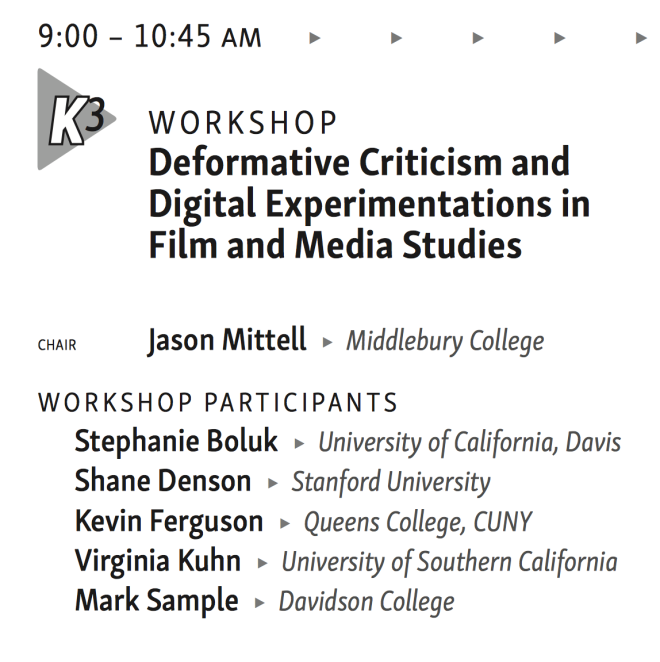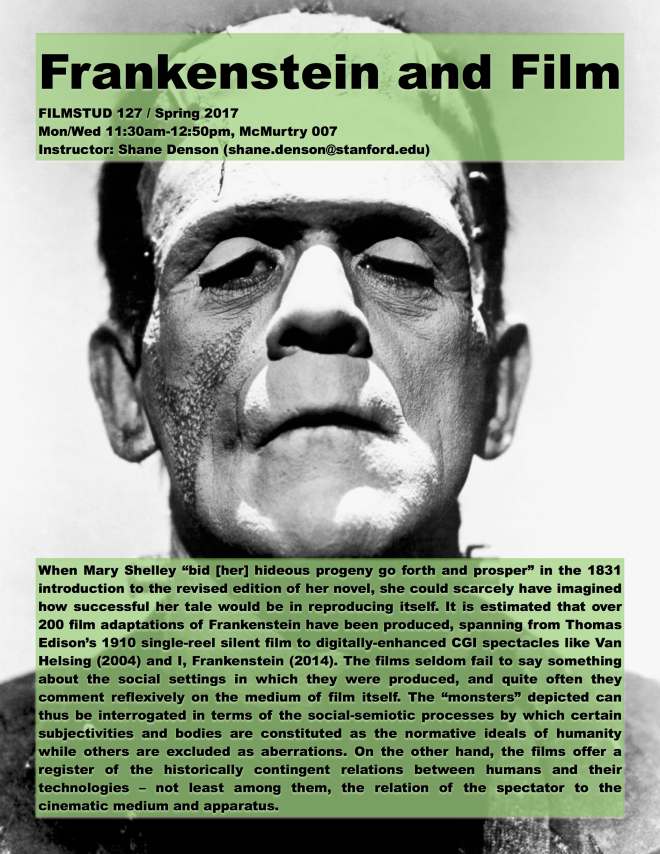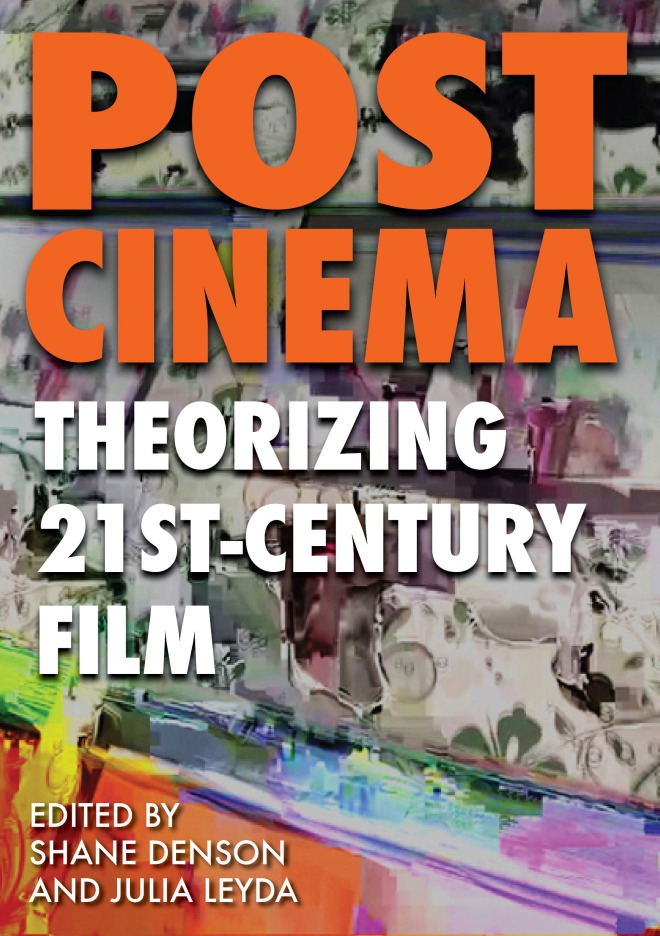
If you’re in Chicago for the Society for Cinema and Media Studies conference this week, come check out our workshop on “Deformative Criticism and Digital Experimentations in Film and Media Studies” on Friday, March 24 at 9am. More info here.

If you’re in Chicago for the Society for Cinema and Media Studies conference this week, come check out our workshop on “Deformative Criticism and Digital Experimentations in Film and Media Studies” on Friday, March 24 at 9am. More info here.

Flyer for my “Frankenstein and Film” class, Spring 2017 at Stanford. Complete syllabus here.
Syllabus for “Frankenstein and Film” (Spring 2017).
Syllabus for the next iteration of my seminar “Post-Cinema” (senior capstone / graduate seminar), Department of Art & Art History, Winter 2017.

This coming Wednesday (Nov. 16, 2016 at 6pm), I will be presenting a talk titled “Animating Frankenstein: Film, Comics, Visual Culture.” The event is organized by the Stanford Graphic Narrative Project (under the leadership of Mia Lewis and Scott Bukatman) and hosted by the Stanford Humanities Center. More info here.

I am pleased to announce that Post-Cinema: Theorizing 21st-Century Film, which I co-edited with Julia Leyda, is now available for download in PDF format.
The open-access book, which has been available in an online HTML version since earlier this year, weighs in at a whopping 990 pages (!) and can now be downloaded for offline reading in two versions (9mb or a higher-quality 13mb version).
There are also two new endorsements for the book. First, from Tanya Horeck at Anglia Ruskin University:
Post-Cinema: Theorizing 21st-Century Film is an intellectually exciting and important book. Editors Shane Denson and Julia Leyda have assembled an extraordinary range of notable contributors with the aim to open up a critical conversation on the very notion of the post-cinematic – something they achieve in a most novel and engaging way. Through essays and roundtable discussions, Post-Cinema formulates fresh and nuanced questions about the consumption and spectatorship of post-millennial film and other media as they circulate through contemporary digital media ecologies. As is fitting given its subject matter of changing media formats, the design and layout of this book – with its open access digitality and its collaborative dialogues – is as relevant and pioneering as its content. Inviting us to rethink received ideas about how 21st-century media reshape “new forms of sensibility,” Post-Cinema: Theorizing 21st-Century Film is critically imperative reading for anyone interested in ongoing vital transformations in moving image media.
– Tanya Horeck, Reader in Film, Media, and Culture, Anglia Ruskin University
And also an endorsement from Michael Lawrence at University of Sussex:
The essays and discussions that have been assembled in Post-Cinema: Theorizing 21st–Century Film provide the reader with a remarkably comprehensive and compelling survey of the diverse critical and theoretical responses to the formal, technological, affective, political and ecological dimensions of our contemporary post-cinematic landscape. That landscape now has an authoritative and inspirational field guide: by gathering together foundational interventions alongside the most recent contributions this collection will prove indispensable to anyone wishing to take these conversations forward.
– Michael Lawrence, Reader in Film Studies, University of Sussex
More info and an official announcement can be found here.

I am happy to announce, at long last, the publication of Post-Cinema: Theorizing 21st-Century Film, edited by Shane Denson and Julia Leyda, which is out today as a completely free and open-access volume with REFRAME Books.
If cinema and television, as the dominant media of the 20th century, shaped and reflected our cultural sensibilities, how do new digital media in the 21st century help to shape and reflect new forms of sensibility? In this collection, editors Shane Denson and Julia Leyda have gathered a range of essays that approach this question by way of a critical engagement with the notion of “post-cinema.” Contributors explore key experiential, technological, political, historical, and ecological aspects of the transition from a cinematic to a post-cinematic media regime and articulate both continuities and disjunctures between film’s first and second centuries.
The book will appear in several digital formats: the web-based version is online today, and several ebook formats will be appearing soon.
The book brings together foundational texts by some of the key voices in the discussion of post-cinema and places them next to a range of brand-new chapters, as well as a series of roundtable discussions.
The long list of contributors includes:
Caitlin Benson-Allott, Paul Bowman, Felix Brinker, Kristopher L. Cannon, Francesco Casetti, Steen Christiansen, Elena del Río, Shane Denson, Rosalind Galt, Therese Grisham, Richard Grusin, Leon Gurevitch, Mark B. N. Hansen, Bruce Isaacs, Adrian Ivakhiv, Kylie Jarrett, Selmin Kara, Julia Leyda, Patricia MacCormack, Lev Manovich, Ruth Mayer, Michael O’Rourke, Patricia Pisters, Alessandra Raengo, David Rambo, Nicholas Rombes, Sergi Sánchez, Karin Sellberg, Steven Shaviro, Michael Loren Siegel, Vivian Sobchack, Billy Stevenson, Andreas Sudmann
Here is the table of contents:
A brief “press release” with a description of the book and the complete table of contents is available here (opens as a PDF): POST-CINEMA-Press-Release